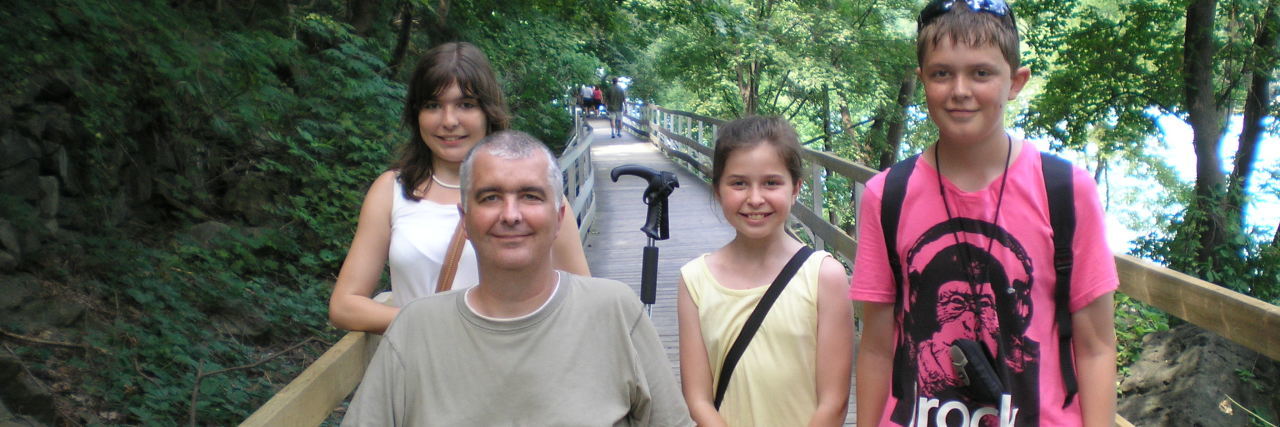The “We Diagnosis” is a concept that came to me earlier this year. Whilst sat in a radio interview with my boss, Michael, his wife Suzanne and their daughter Katelynn, I consistently heard Michael refer to Suzanne’s diagnosis of MND in the plural sense, as if motor-neurone disease wasn’t just her diagnosis, but the entire family’s. I had never thought of it quite as explicit as that, but when reflecting on my own personal situation I realized that a diagnosis for any medical condition is rarely singular. I spoke to my own family about our journey with this.
My dad, Mark, was diagnosed with complex regional pain syndrome in his right hand and right foot in 2003 after a work accident. He very quickly deteriorated and ended up using a walking stick and a motorized wheelchair for any long distances. Naturally, this condition massively affected his life as he had to give up his teaching career and venture through the experimental health system as he tried to figure out a solution to manage his pain. Despite the diagnosis being for him, his condition affected the entire family unit.
I spoke to my mum, Lois, about her perceptions of what occurred. She agreed it wasn’t a singular diagnosis and said, “We all have to adapt to what we can and can’t do as a family so we stay cohesive. It is important that we still do things together and that the person with the diagnosis doesn’t get left out, as they are still an important part of the family unit despite the life change.” In relation to the initial diagnosis, she said,
“The biggest immediate change was that our life changed from him being the breadwinner and me working part-time to me being the sole breadwinner. Whilst all that change occurred, we had to deal with the crushing realization that some of our long-term dreams, such as traveling, were going to be significantly affected. Personally, I had to adapt to the variability of days. Some days, Mark was good, and he could be a part of running the household. Other days I was a single mum trying to juggle everybody’s needs.”
It became quite clear through our conversations that my dad’s diagnosis had changed my mum’s entire life and flipped her world upside down.
I also spoke to my siblings about their experiences and how they think it changed them. My sister Ceri, who works in child care and has now taken up a certificate in disability support, has clearly been shaped by the change in her life. “It made me value the opportunities I had and never take any of them for granted. Any opportunity that came my way, I valued so much more because I could do it. I wasn’t restricted in any manner in the same way Dad was.” My brother Josh agreed that it makes you value the opportunities you have and go for anything and everything.
I thought long and hard about my own viewpoint before writing it down. Sure, when I was younger, it definitely affected me in my daily life. Mum and Dad were often traveling around the U.K. to see a specialist, so I had my grandparents look after me, a change in their life as well as mine. I often had a friend’s mum walk me to and from school or my older siblings would drop me off and pick me up. There were plenty of physical changes that happened in my life, but it is clear to me now that it changed my outlook on life.
When I was 10, I had a strong sense of justice for wheelchair users. I wrote a strongly worded letter to the Prime Minister of England about the lack of drop curbs in my little town and the fact that people without disabled permits were parking in designated disabled spots. I can’t say it made a difference to my town, but it made a difference to me. I viewed the roads differently when I was walking as I noticed each bump. Walking into a shop that only had stair access became a noteworthy observation. I valued my ability to walk with ease, and I often refused to complain when I had a tummy-ache because I didn’t have pain like Dad’s.
I found it taught me to value the simple ability of walking and to treasure the moments where Dad’s pain was manageable, and he could bake with me or sing and dance to Meatloaf around the kitchen. Although I don’t think my mum always appreciated my dad’s willingness to let me experiment with food coloring, I treasure those moments with him. I didn’t get to play rough and tumble with my dad or even hold his hand sometimes when walking home from school (the wheelchair was a lot faster than what my little legs could walk), so I suppose I value different memories to those children with able-bodied parents.
Most importantly, I have found that a we diagnosis opens the doors to communication a lot wider. It allows for a stronger connection as you speak about issues on a much deeper level. I can honestly say, and my Dad agrees with me, that despite the pain, in a lot of ways it was his disability that allowed our family to be as close as it was. We have each other’s back in a proactive way that is intentional and gives us an opportunity to interact on a deep and meaningful level.
Disability often has a negative connotation around it, when in reality it doesn’t need to. Sure, there are struggles with it, but facing a diagnosis together, with family and friends, can lead to much greater experiences and connections that wouldn’t have been possible without it. It’s become a part of our identity and we battle the diagnosis together each day.
This story originally appeared on Suzanne Stays.

